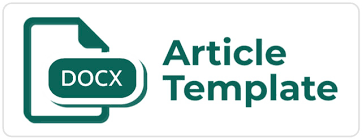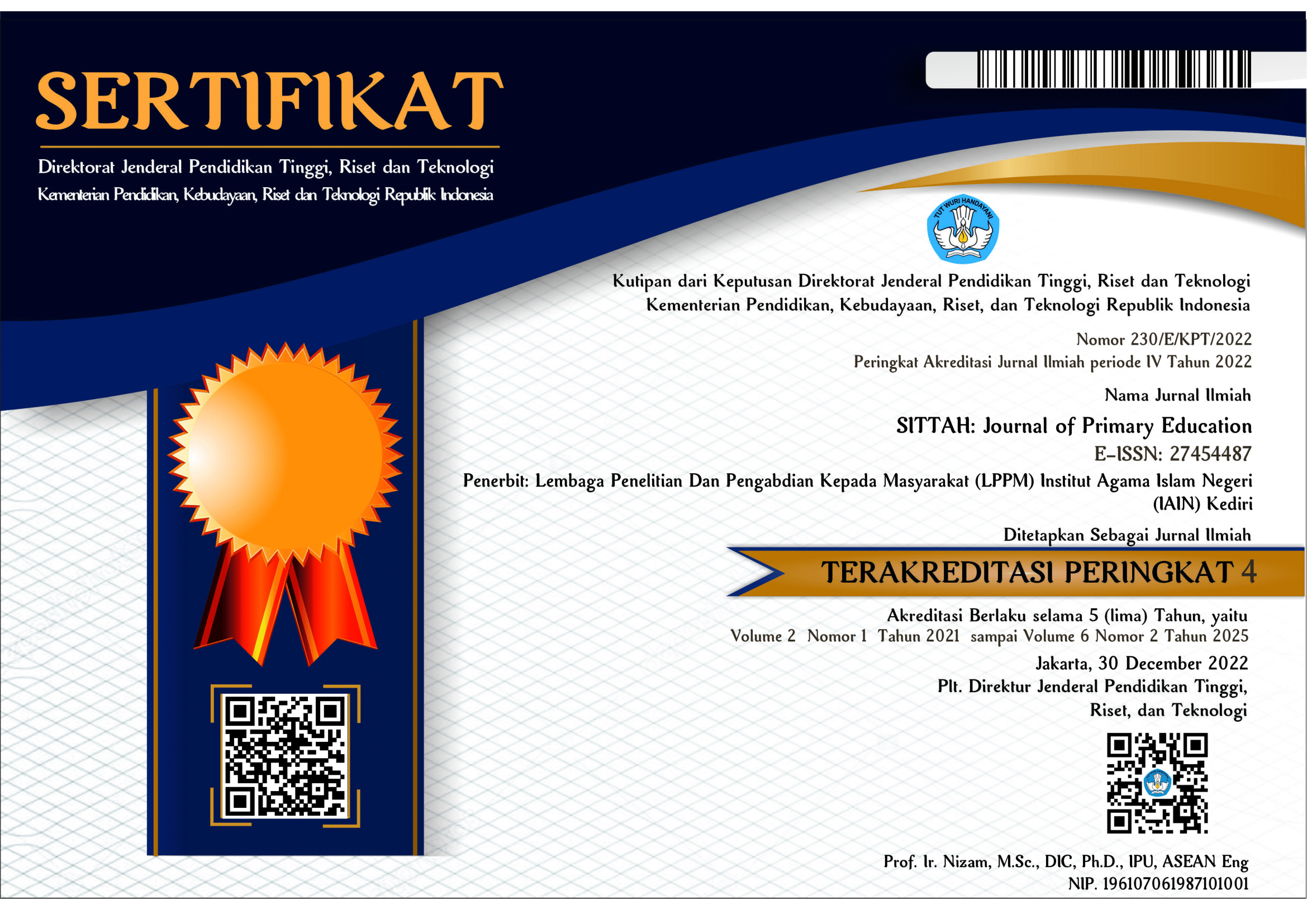PROFESSIONAL ABILITY OF PROSPECTIVE ELEMENTARY SCHOOL TEACHER THROUGH PROJECT-BASED LEARNING MODEL IN PRIMARY EDUCATION
DOI:
https://doi.org/10.30762/sittah.v4i1.917Keywords:
PjBl Model, Primary Education, Professional Competency, Prospective Elementary School TeachersAbstract
Today's rapid technological advances must be accompanied by the professional competence of educators, especially in integrating technology and project-based learning models. This research is a systematic review study to analyze the professional competency of teachers, the PjBL model in Primary Education, and the relationship between the professional abilities of teachers to implement the PjBL model in learning at elementary school. An article search through the Google Scholar database found 33600 journal articles after inclusion and exclusion were carried out. Ten journals were obtained for systematic review. From the results of a systematic study, it was found that there were journals that stated that the teacher's motivation in using the PjBL model had a direct impact on increasing the ability of children to develop their mindset towards the material being taught. It was also found that the ability to implement the PjBL model was combined with other learning models and approaches, and the ability of teachers to apply the technology-assisted PjBL model, so, in general, the competence of prospective elementary school teachers can be improved through the PjBL model. Based on the findings of a review of ten relevant journals, it can be said that using the PjBL model in learning presents some difficulties, particularly at the basic education level. Therefore, higher education institutions are expected to design the models and techniques to prepare student-teacher candidates to develop professional competence by innovating, being creative, and utilizing technology through project-based learning.
Downloads
References
Al-Busaidi, S., & Al-Seyabi, F. (2021). Project-based learning as a tool for student-teachers' professional development: A study in an Omani EFL teacher education program. International Journal of Learning, Teaching and Educational Research, 20(4), 116–136. https://doi.org/10.26803/ijlter.20.4.7
Alrajeh, T. S. (2021). Project-based Learning to Enhance Preservice Teachers' Teaching Skills in Science Education. Universal Journal of Educational Research, 9(2), 271–279. https://doi.org/10.13189/ujer.2021.090202
Baysura, O. D., Altun, S., & Yücel-Toy, B. (2016). Perceptions of Teacher Candidates regarding Project-Based Learning. Eurasian Journal of Educational Research, 16(62), 15–36. https://doi.org/10.14689/ejer.2016.62.3
Chen, C. H., & Yang, Y. C. (2019). Revisiting the effects of project-based learning on students' academic achievement: A meta-analysis investigating moderators. Educational Research Review, 26, 71–81. https://doi.org/10.1016/j.edurev.2018.11.001
Chiang, C. L., & Lee, H. (2016). The Effect of Project-Based Learning on Learning Motivation and Problem-Solving Ability of Vocational High School Students. International Journal of Information and Education Technology, 6(9), 709–712. https://doi.org/10.7763/ijiet.2016.v6.779
Dewey, J. (1959). The Child and The Curriculum. University of Chicago Press.
Fernandes, S. R. G. (2014). Preparing Graduates for Professional Practice: Findings from a Case Study of Project-based Learning (PBL). Procedia - Social and Behavioral Sciences, 139, 219–226. https://doi.org/10.1016/j.sbspro.2014.08.064
Guo, P., Saab, N., Post, L. S., & Admiraal, W. (2020). A review of project-based learning in higher education: Student outcomes and measures. International Journal of Educational Research, 102, 101586. https://doi.org/10.1016/j.ijer.2020.101586
Jacka, L. (2015). Virtual worlds in preservice teacher education: The introduction of virtual worlds in preservice teacher education to foster innovative teaching-learning processes. https://doi.org/10.13140/RG.2.1.2932.0164
Juuti, K., Lavonen, J., Salonen, V., Salmela-Aro, K., Schneider, B., & Krajcik, J. (2021). A Teacher–Researcher Partnership for Professional Learning: Co-Designing Project-Based Learning Units to Increase Student Engagement in Science Classes. Journal of Science Teacher Education, 32(6), 625–641. https://doi.org/10.1080/1046560X.2021.1872207
Arslantaş, T. K., & Kocaöz, O. E. (2021). Examining the Mentoring Process in Collaborative Project-based Learning of Preservice Instructional Technology Teachers. Education Reform Journal, 6(1), 47–61.
Lin, K.-Y., Wu, Y.-T., Hsu, Y.-T., & Williams, P. J. (2021). Effects of infusing the engineering design process into STEM project-based learning to develop preservice technology teachers' engineering design thinking. International Journal of STEM Education, 8(1), 1. https://doi.org/10.1186/s40594-020-00258-9
Uebe Mansur, A. F., Alves, A. C., & Torres, R. B. (2019). Trello as virtual learning environment and active learning organizer for PBL classes: An analysis under Bloom's Taxonomy. http://repositorium.sdum.uminho.pt/
Maritasari, D. B., Setyosari, P., Kuswandi, D., & Praherdhiono, H. (2022). The Effect of Project Based Learning Assisted by Mobile Learning Applications and Learning Motivation on the Competence and Performance of Teachers. Al-Ishlah: Jurnal Pendidikan, 14(3), Article 3. https://doi.org/10.35445/alishlah.v14i3.1116
Miller, E. C., Reigh, E., Berland, L., & Krajcik, J. (2021). Supporting Equity in Virtual Science Instruction Through Project-Based Learning: Opportunities and Challenges in the Era of COVID-19. Journal of Science Teacher Education, 32(6), 642–663. https://doi.org/10.1080/1046560X.2021.1873549
Miller, E. C., Severance, S., & Krajcik, J. (2021). Motivating Teaching, Sustaining Change in Practice: Design Principles for Teacher Learning in Project-Based Learning Contexts. Journal of Science Teacher Education, 32(7), 757–779. https://doi.org/10.1080/1046560X.2020.1864099
Ngo, H. Q. T., & Phan, M. H. (2019). Design of an open platform for multidisciplinary approach in project-based learning of an EPICS class. Electronics (Switzerland), 8(2). https://doi.org/10.3390/electronics8020200
López Núñez, J. A., López Belmonte, J., Moreno Guerrero, A. J., & Pozo Sánchez, S. (2020). Effectiveness of Innovate Educational Practices with Flipped Learning and Remote Sensing in Earth and Environmental Sciences—An Exploratory Case Study. Remote Sensing, 12(5), Article 5. https://doi.org/10.3390/rs12050897
Ortiz-Colón, A., Castellano-Almagro, R., Rodríguez Moreno, J., & Agreda Montoro, M. (2021). Initial and In-Service Training for Secondary School Teachers to Implement Project-Based Learning (PBL). Education and New Developments 2021, 187–191. https://doi.org/10.36315/2021end040
Pitrawati, Fadillah, & Yuniarni, D. (2017). Analisis Kompetensi Profesional Guru Paud Di Kecamatan Serasan Kabupaten Natuna. Jurnal Pendidikan Dan Pembelajaran, 5(4), 1–11. http://dx.doi.org/10.26418/jppk.v5i4.14984
Siedel, H., & Stylianides, A. J. (2018). Teachers' Selection of Resources in an Era of Plenty: An Interview Study with Secondary Mathematics Teachers in England. 119–144. https://doi.org/10.1007/978-3-319-73253-4_6
Trouche, L., Rocha, K., Gueudet, G., & Pepin, B. (2020). Transition to digital resources as a critical process in teachers' trajectories: The case of Anna's documentation work. ZDM - Mathematics Education, 52(7), 1243–1257. https://doi.org/10.1007/s11858-020-01164-8
Valverde-Berrocoso, J., Garrido-Arroyo, M. del C., Burgos-Videla, C., & Morales-Cevallos, M. B. (2020). Trends in Educational Research about e-Learning: A Systematic Literature Review (2009–2018). Sustainability, 12(12), 5153. https://doi.org/10.3390/su12125153
Viro, E. et al. (2020). Teachers' perspective es on pro ning in m mathema tics and science s. European Journal of Science and Mathematics Education, 8(1), 12–31.
Wardani, D. S., Fauzi, M. R., Zafira, R., & Kurniawati, D. (2020). Creating Props: Improving Writing Skills of Teaching Materials of Elementary Teacher Education Students through Project-Based Learning Model. Mimbar Sekolah Dasar, 7(2), 216–234. https://doi.org/10.17509/mimbar-sd.v7i2.26334
Downloads
Published
How to Cite
Issue
Section
License
Copyright (c) 2023 Sarah Fazilla, Yullita Molliq Rangkuti

This work is licensed under a Creative Commons Attribution-NonCommercial-ShareAlike 4.0 International License.











